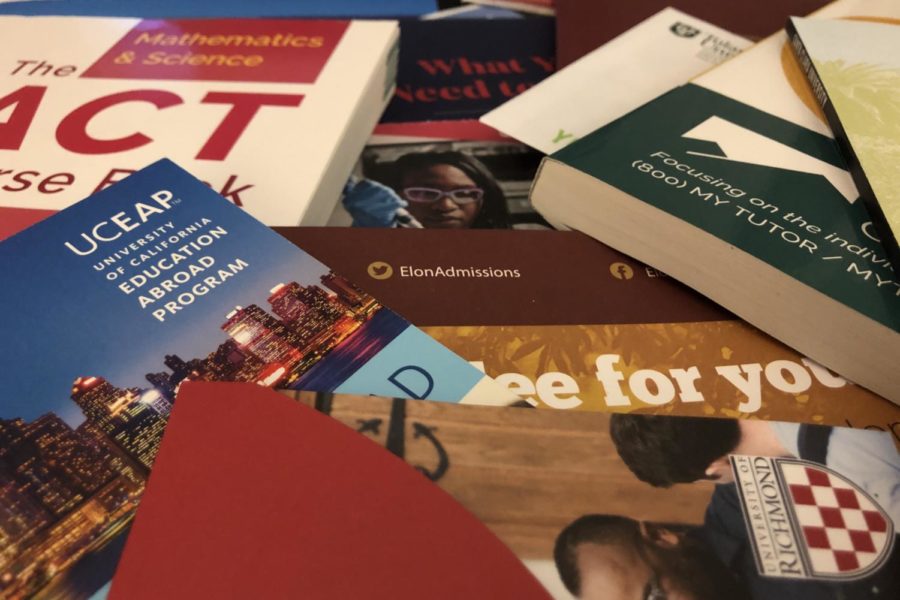Navigating your future: A guide to college applications
Credit: Jessica Reilly
For seniors choosing college as their next step, applying can be a confusing process. As deadlines approach, some students have become stressed. WSPN has created a guide to help students navigate their way through the application process.
September 25, 2019
It’s that time of year: seniors are in the thick of the college application process. For many, the days of college tours and exciting hypotheticals have transformed into a swath of work. College applications can not only be time consuming but also confusing. The process is different for everyone, so it can be hard to determine what you need to get done. To provide some guidance during such a stressful time, WSPN created an application cheat sheet.
Pick Your Schools
Construct a list of schools you plan on applying for admission. If you are still in the college search process, your guidance counselor, Naviance and College Board’s BigFuture are great resources to help you with researching schools.
Types of Applications
Using your list of schools, determine what type of application each requires. You can apply to many schools with the uniform Common App. However, keep an eye open for schools that require an independent applicator or a Coalition Application. You will likely need to complete a lengthy profile on yourself for all application types. Make sure you have a parent or guardian to help you with any financial or family history information.
Types of Deadlines
Using your list of schools, determine the different application deadlines each school offers. You can research this information by looking up each school on Naviance. Once you have determined the deadline for each school you are applying to, use the dates to help you schedule the work for each application. The application deadline terms can be a point of confusion for many students, so make sure you know what each type of deadline means.
Early Decision (ED): Applying early decision is a binding agreement that states you must attend the school if you’re accepted. Early decision applications are normally due in early November and often result in a decision announced in December. This may be a good choice for students who have a clear-cut top choice, are willing to receive their financial aid package after being enrolled and want to demonstrate their interest to admissions officers.
Early Action (EA): Early action applications are also usually due in November and produce a decision in December. However, this is not a binding decision. This may be a good choice for students who are prepared to apply early and want to find out their admission status earlier but don’t want to make a binding decision. Whereas you may only ED to one school, you can usually apply to as many schools EA as you want.
Restricted Early Action (REA): A few top schools such as Harvard and Georgetown employ restricted or single-choice early action, a policy that effectively functions as early decision but without the binding contract. You will still receive a decision in mid-December and are still only able to apply REA to one school, but you are not obligated to attend if you’re accepted.
Regular Decision (RD): Regular decision applications are usually due from January to February, and students find out their application status in the spring. This is the traditional method of applying and may be a good choice for students who need some extra time to get their grades up, take standardized tests, complete their application or hear back from other schools.
Rolling Admissions: Rolling admissions is the gradual acceptance of students over a period of time. Some schools offer rolling admission until the program is full, while others have specific deadlines. If you are applying to a school with rolling admission, it is best not to wait too long or the program may fill up.
Test Scores
Many schools require standardized testing scores such as the SAT, ACT and SAT subject tests. However, some schools have become test-optional. This means that you have the choice of sending your scores as a part of your application.
Standardized testing scores can often be submitted by self-reporting them on the Common App. However, many schools require that they be sent directly from the SAT or ACT. If you wish to report your scores to a school, you can log onto your SAT or ACT account to send them directly to that school.
Naviance
As a WHS student, you have a Naviance account. Aside from college researching tools, Naviance has many other functions that are essential to the application process.
If you are applying with the Common App, you need to connect your Naviance and Common App accounts. This allows for all your information on Naviance to be linked to your applications.
Naviance can be used to request transcripts for all the schools you are applying to. You can do this by moving your schools into “Colleges I’m Applying to” and clicking “Request Transcript” in the top left corner.
Naviance can also be used to request letters of recommendation. After successfully asking a teacher for a letter in person, you may request the recommendation letter in Naviance. In doing this, you will have the option of waiving your right to view the letter with the FERPA release authorization from.
Main Essay
The Common App, Coalition Application and most independent applications require at least one essay about yourself. There are often a set of flexible prompts to help guide your response. Schools get a very clear picture of your academics through your transcript, course selection and standardized testing, so this is a great opportunity to highlight other aspects of yourself. Make sure you are aware of the word limit and abide by it. Getting feedback from parents, friends, mentors and teachers is a great way to make sure you are putting your best foot forward.
Supplemental Essays and Other Requirements
What individualizes the application process for each school are their supplemental requirements. This part of the application depends on the college because each school needs to determine if you are a good fit.
Many schools will ask for a few short supplemental essays in addition to the core of the application. Some schools also offer or require an interview. If you feel confident, this may be a good opportunity for the admissions office to get a more authentic and complete picture of you. Supplemental requirements often concern a school’s values, so make sure to do your research and be specific when answering.
Still confused? Senior seminar will include everything mentioned above and more, so it’s important to make sure you have it incorporated into your schedule. The guidance department is a great resource to help answer your questions – contact your guidance counselor for any pressing questions about applications.





![Last Wednesday, the Wayland School Committee gathered to discuss a number of topics regarding the health curriculum and Innovation Career Pathway course. Another large topic of conversation was the ways to potentially mitigate distracting cell phone usage. "These [phones] are going to distract your learning and social relationships," Superintendent David Fleishman said. "That's concrete right there."](https://waylandstudentpress.com/wp-content/uploads/2025/06/Screenshot-2025-06-04-at-9.49.31 PM-1200x886.png)



























![Troy Hoyt finishes the Boston Marathon, running for the Hoyt Foundation. T. Hoyt is the son of Hoyt Foundation CEO Russ Hoyt.
“[Running a marathon] might seem like a big thing, when it’s presented to you at first, but if you break it up and just keep telling yourself, “Yes, you can,” you can start chipping away at it. And before you know it, you’ll be running the whole 26 miles, and you won’t even think twice about it.” T. Hoyt said.](https://waylandstudentpress.com/wp-content/uploads/2025/04/C36E8761-1CBB-452E-9DF2-543EF7B1095E_1_105_c.jpeg)













































